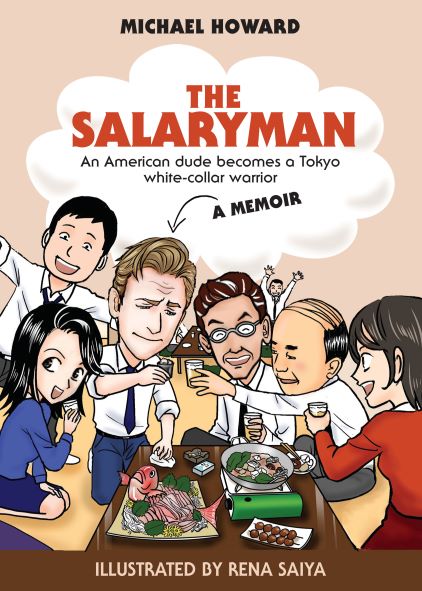Michael’s story shows that networking and maintaining relationships is crucial to one’s success. Live vicariously through his words and get inspired to start taking steps in your desired direction.
Welcome to the Senpai Success Story, where you can read about others who have walked a unique career path using their Japanese language/cultural skills. (Senpai means “mentor” or “teacher,” and the concept is important to understand for anyone wishing to work in a Japanese business setting.)
A Japan Work Theory From an American Salaryman
During my 13 years in Japan, the following has happened to me:
- I lost my job while my wife was pregnant and was then unemployed for six months.
- A few months later had my house broken into at night while the baby and us were sleeping.
- I failed my Japanese driver’s license test six times.
- I worked in an office where a few of my Japanese coworkers were involved in racketeering with a yakuza.
- I had knee surgery and continued my 80-minute-each-way Tokyo commute on crutches for two months, because there was no work from home option at my Japanese company.
- I was twice ordered to move away from my family for six months and work at a remote office by my Japanese company.
- Finally, I went through a divorce in the Tokyo family courts.
And yet, I’d do it all over again.
Repeatedly during my country and western song of a Japan story I’ve escaped true disaster, and even found some success, by trusting in my relationships with Japanese friends and colleagues, who’ve always helped me overcome all those challenges.
More than just overcome, those relationships have brought peaks that’ve made those valleys more than worth it. It’s taught me that my most reliable skill as a Japan immigrant is maintaining my connections with my old co-workers (God knows it hasn’t been my Japanese language ability!).

My Original Interest in Japan
A theme of my life has been some close friendships with some very unique Japanese people, whose generosity and outgoingness altered my way of thinking and my path.
This started in second grade with my friendship with a Japanese boy whose father had just been transferred by his company to my city in suburban Chicago. My friend’s name was Aki, and he destroyed any pre-conceived notion my family and I had that all Japanese people were reserved. He’d bike over to my house to find me, let himself in (those were the days doors were left open) and find me in my room, where he’d taunt me in Japanese as he destroyed me on the Nintendo or do something else awe-inspiring, like assembling my radio-controlled car model, without the instructions, in less than an hour.
Years later in college, I was similarly impressed by another Japanese transfer student named Masa, who flew into our campus as an always-smiling, 6’2” rugby-playing social butterfly.
Looking back, these friendships instructed my own eventual way to overcome challenges in Japan: neither Aki nor Masa could speak much English and succeeded largely with their outgoing personalities and pure sincerity.
Put the Time Into the Relationships
After I was let go from my Japanese company in 2010 (long story short: the Lehman Shock had just happened, there was a deep recession and I was a contract employee), I spent a long summer and fall unemployed in Tokyo, the lowlight being my depressing, mandatory monthly visits to Hello Work, Japan’s perky-named government unemployment insurance service.
One day a former Japanese coworker from my previous company who I was friendly with offered to drown my sorrows in a drinking lunch after my Hello Work appointment. I was in such a funk that I almost said no to his kind offer, but I forced myself to go, bringing my three-month old son with me as added inspiration.
Thank God I went, because a couple of months later my friend ended up introducing me to my next job, a life-saving role at his company that ended up being created specifically for me. It was a middle-aged reminder that relationships can cut through formal language requirements, and that (to paraphrase Woody Allen) sometimes life, in any country, is simply about showing up.

Crystalize Your Japan Career Theory
My overarching advice is to find your own career theory for making your Japan career dreams happen. One that fits your life story.
I crystalized my own work-relationships-trumps-all theory this past spring. I actually had moved back to my hometown of Chicago with Amazon in September 2020 after working for Amazon Japan for a few years before that. I had intended to stay in Chicago for the long-term, but the job ended up being a bad fit and I was looking at the possibility of being unemployed, again.
An intense job-search in the US and Japan quickly revealed which country was my real career home. I heard mostly crickets after my US job applications, but I soon landed another “life-saving” job back in Tokyo with an audio company that had been one of my customers in my early career in Los Angeles.
The reason? The Japanese hiring manager remembered me and what I did before, and was still at the company. Our Chicago/Tokyo Zoom interview in Japanese surely left him underwhelmed on my language ability, but our history and personal connection won the day.
His sentimentality and loyalty thread the job needle for me and overcame all the cross-country moving odds that were stacked against me during the COVID pandemic. It was the ultimate proof of what has become my hard-earned Japan work philosophy.
About Michael Thuresson

Michael Thuresson (pen name: Michael Howard) is a part-time author from Chicago and was a journalist-turned-businessman in Los Angeles before he joined the Tokyo salaryman brotherhood in 2008. He has basically lived in Tokyo since 2008 and now works full-time as a product manager at an American technology company.

The Salaryman, published in July 2019 andhailed by the Japan Times as “astute…thoroughly entertaining”, was his first book. He spun off a free manga series from the book in 2020 and would appreciate any and all feedback and support in order to continue its development. Subscribing to the author web site’s Reader List is hugely helpful!
Links:
Author web site: www.thesalarymanbook.com
LinkedIn profile: (1) Michael Howard Thuresson | LinkedIn
Twitter: (20) Michael Howard (@SalarymanMike) / Twitter
Facebook: (20+) The Salaryman: An American dude becomes a Tokyo white-collar warrior | Facebook